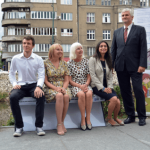A successful Croat in Japan.
There are many Croats who have succeeded abroad, but few have managed do to it in Japan. One of them is Nikola Pavešić from Rijeka, who has been able to do it before he turned 30. Prior to Japan, Nikola first worked as an apprentice in Tanzania at the International Tribunal for Rwanda. He graduated in international relations and law in Bologna and has a master’s degree in international trade law from the University of Newcastle, reports Vecernji List on December 28, 2015.
“I have lived in Tanzania for seven to eight months. I played rugby for the Tanzanian national team”, Nikola says. After a brief work experience in Zagreb, Nikola signed up for apprenticeship at the University of the United Nations which has 15 campuses around the world, with headquarters in Tokyo. “I went there with the intention to leave after four months, but I have stayed there for more than four years. I first designed and worked on the Pelican system for managing projects, and then I was hired as a consultant for an American-Japanese venture capital firm RBV, which deals with angel investments. There I analyse innovations and start-ups”, says Nikola who until recently also managed his own project called Justa, a job portal for start-ups.
“The problem is that in Japan the crisis has begun in the 1990s. Their economy has been contracting since then and they are now forced to invest heavily in innovations. Japan is currently lagging behind Silicon Valley and Israel, although they are still a very rich country and therefore new technologies are a priority for them”, the young businessman says.
Even though the Japanese like Western culture, such as Italian fashion and French cuisine, they are still a closed society. There are only about million and a half foreigners working in Japan, so European experience is in demand. In Tokyo, Nikola organizes Pioneers Asia, the Asian version of a major Austrian start-up festival Pioneers which recently visited Zagreb as well with the Pioneers of the Balkans conference.
“Language is the biggest problem. It is very hard to learn Japanese, but it can be of great help in business. Japanese are shy people and generally do not speak English. The first two weeks I did not even go to restaurants because I could not understand the menus. I ate only sandwiches which I bought in shops. But in Tokyo, which has 35 million people, there is almost no crime at all. Everything is perfectly organized, urban transport, for example. Apartments are very expensive, studios can cost up to a thousand dollars a month, but the food is rather cheap”, Nikola says.
Football and baseball are the most popular sports, followed closely by rugby. “All Japanese players are employed by companies which have their own teams. I now play for the IBM team because as a foreigner I do not have to be an employee. Japan has the largest number of rugby clubs and players in the world. I intend to stay in Japan as long as I can play rugby, though I will not stay here for the rest of my life”, Nikola Pavešić concludes.









